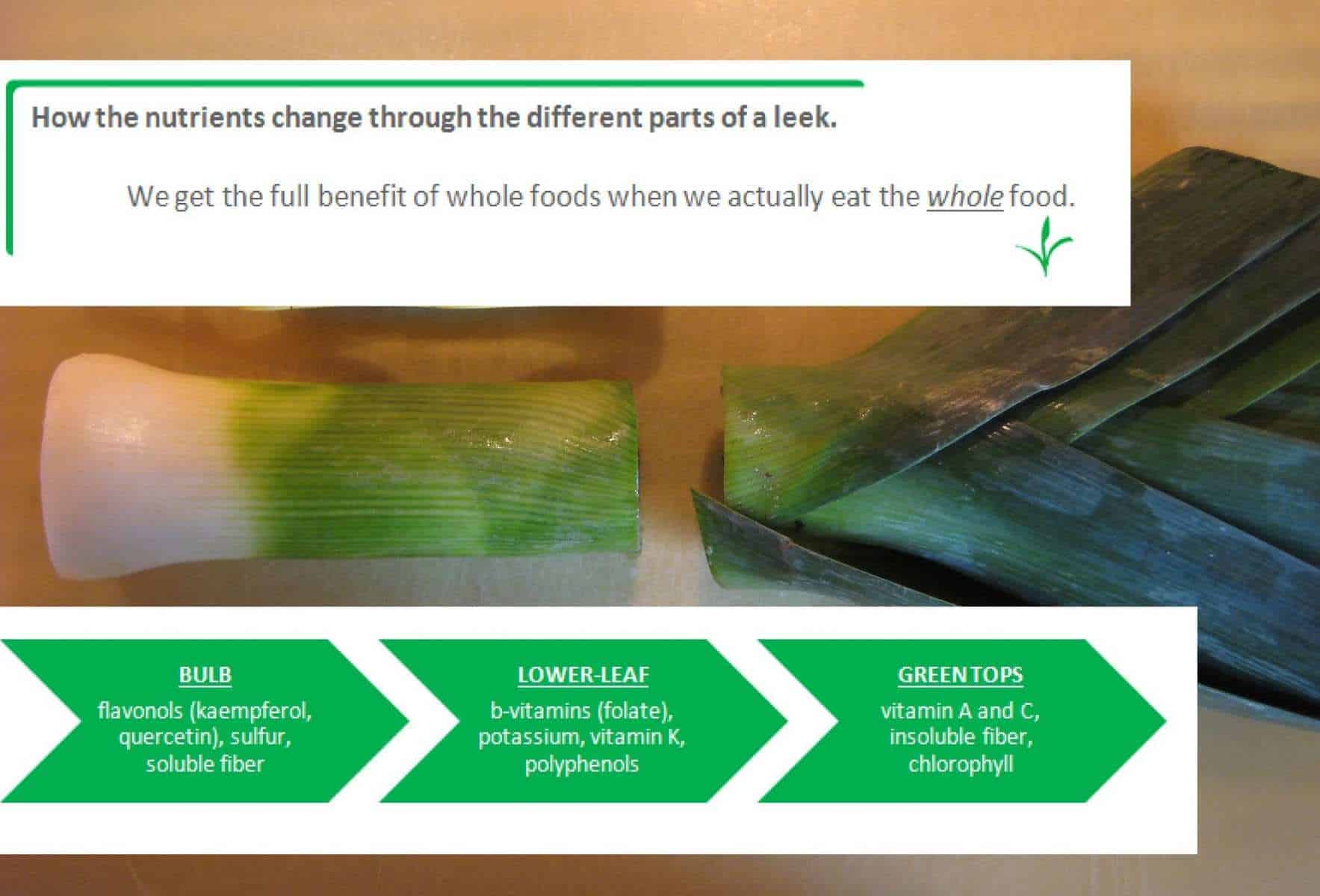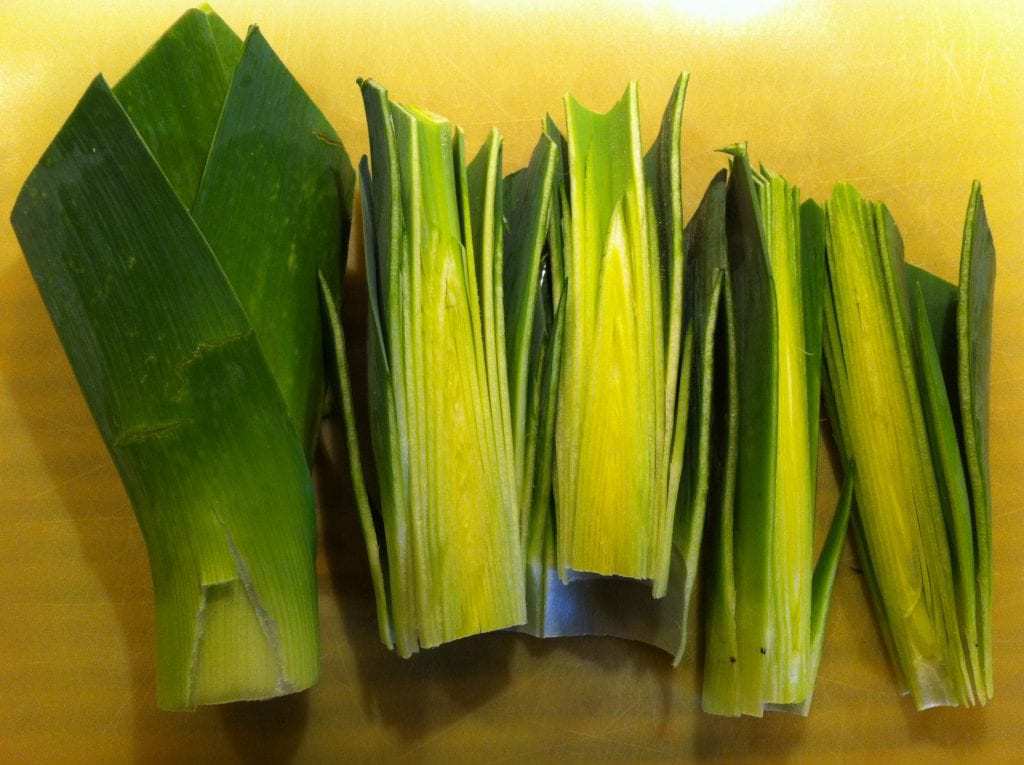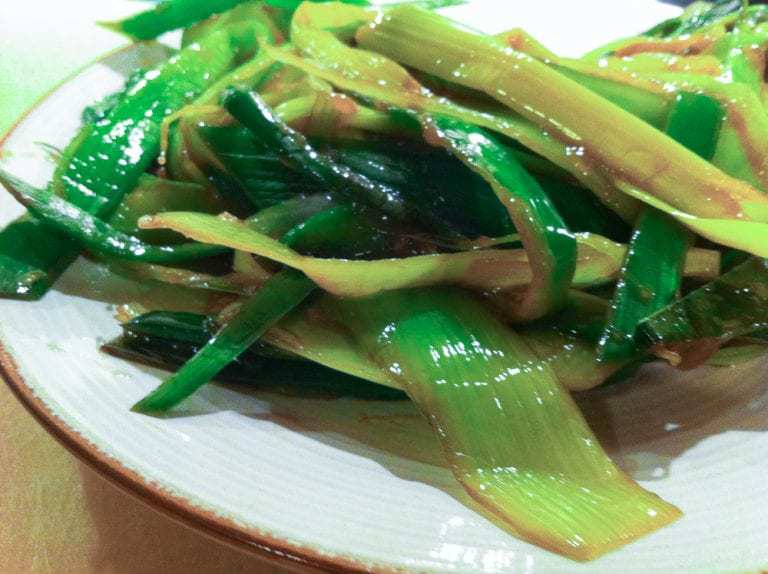 Cooking Leek Greens
Cooking Leek Greens
Milder than onion, easy, and surprisingly delicious!
I, admittedly, only recently found out how absolutely surprisingly delicious leek greens are (those dark green tops of leeks); and how easy to cook! Leek greens seemed fibrous to me and so I defaulted to using them for stock (or compost). I knew, just from color alone, that I was discarding beneficial nutrients (and money!). I made leek soup this past weekend and saved the green tops for testing. I was amazed that something so simple and tasty had eluded me for this long. Sorry compost bins – these greens are for us now!
Leek greens are much milder when sautéed than onion but cook just as fast. The variations for the simple glaze below are limitless. I tested this recipe, as well as, a version using almond oil, coconut milk, and curry that will be wonderful with chickpeas and fresh cubed pineapple.

Other vegetables could easily be added to this while sautéing. Mushrooms and artichokes would make a wonderful topping for tofu or tempeh. Sautéed leek greens would serve well with any lighter protein like tofu, seafood, or fish.
I also read a tip on Foundation – Louis Bonduelle’s site to use leek greens (like banana leaves) to bake or grill fish in a pouch. So have fun!
Leek greens are leafy & tender veggies on your balanced plate.
Research on the nutrients in leek greens is limited. The above diagram uses information compiled from the USDA nutrient database and World’s Healthiest Foods.

CARE Recipe: Sautéed Leek Greens; Too Much Nutrition for the Compost Bin
Leek greens are much milder when sautéed than onion but cook just as fast. The variations for the simple glaze below are limitless. I tested this recipe, as well as, a version using almond oil, coconut milk, and curry that will be wonderful with chickpeas and fresh cubed pineapple.
Total Time: 30 minutes
Yield: 4 1x
Ingredients
Scale
- about 8 cups sliced leek greens (amount from 2 medium stalks)
- 1 tablespoon toasted sesame oil
- 1 tablespoon ghee (clarified butter)
- 2 tablespoons soy sauce (reduced-sodium variety can be used)
- 1/4 cup vegetable broth
- 2 tablespoons Mirin or rice wine vinegar (optional)
- 1 tablespoon kudzu (to thicken sauce) mixed with 1 tablespoon water
Instructions
- Slice leek greens in half, fan the leaves and thinly slice. Clean by soaking in a large bowl of cold water and letting the sand settle to the bottom. Repeat until the water is clear.
- While soaking, ‘unlayer’ larger pieces so that you have more uniform single layers of leaves for even cooking.
- Heat oil and ghee in wok or large non-stick skillet over medium-high heat. Add leek greens and sauté until tender (about 8 minutes, they will reduce in volume by about 1/3; can cook longer to lightly caramelize).
- Add soy sauce, broth, Mirin, and kudzu water mixture to form light glaze. Stir well.
- Remove from heat. Glaze will continue to thicken as it cools.
- Prep Time: 20 minutes
- Cook Time: 10 minutes
- Category: Dinner, Side Dish
- Diet: Vegetarian
Nutrition
- Serving Size: 1 cup



What is the nutritional data for whole leek? I can only find data for “white and light green”
Hi Catherine- As mentioned in the post, nutritional information on whole leeks is limited. We used a compilation based on the shared characteristics of the Allium family (of which the onion and leek are included). Included in this compilation is from the USDA Food Composition Database which includes “Onions, young green, tops only” to best estimate nutrients in the upper leek greens and “Leeks, bulk and lower leaf portion”.
Could I use arrowroot powder instead of kudzu?
Hi Raph- Yes, you could arrowroot with good results. You just want a bit of a starch to help thicken the sauce into a glaze (cornstarch would work as well). This helps ensure that the flavor and spices ‘stick’ to the leek tops versus pool in the bottom of your plate or bowl. Thanks for the question!
Kudzu root starch, also called kuzu or kuzuko, is like the Japanese version of corn or potato starch. It comes from the roots of the kudzu plant. (It grows crazy fast in the southern US and kills native plants/trees). You can buy the powder online, at an Asian grocery or maybe a health/whole food type store.
@annie, great question! I’ve just written a post to address your questions: https://www.benedictinewellness.com/kudzu-root-worth-search/
You could absolutely use coconut milk for a soup. I’d personally use a reduced fat coconut milk to watch overall fat content so that I could still use the sesame oil and ghee (they add such incredible flavor, too).
Be sure to let me know if have other questions!
Where do I find Kudzu? Actually what is it? Do you think you could blend this with coconut milk to make a soup?